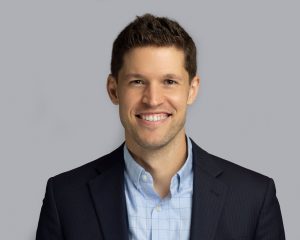Jordan Brensinger is a CGSP-affiliated Assistant Professor in the Department of Sociology at the University of Toronto. He studies how organizations use data to model people and the implications of those systems for everyday life. He is especially interested in how those systems shape the prospects for thriving individuals, organizations, and societies.
You can find more information about Jordan’s projects, Identification and Insecurity in the Data Economy and Investigating the Interdependence of Attitudes Toward Social Groups on our website.
How did you first become interested in your area of research?
I entered my PhD program thinking I wanted to be a sociologist of higher education. Early in my program, I found myself uninspired by the important but often incremental nature of work in that field. I wanted a path that was not as well traveled by sociologists. But what was that path? I had a vague interest in perceived transformations brought about by technology and data science, but beyond that I wasn’t sure.
Then, in September 2017, the credit bureau Equifax experienced a major data breach in the U.S. compromising the data of nearly 150 million Americans, 15 million British, and nearly 20 thousand Canadians. As a consumer vaguely aware of the vast scope of Equifax’s databases, I wondered: What’s going to be done about this? Virtually all the media coverage I read reiterated some version of, “Look out for yourself.” As an aspiring sociologist, I was alarmed and intrigued by the mismatch constituted by this individual-level solution to a systemic failure.

Following the breach, I began looking into data governance and identity theft—the issue at the heart of concerns surrounding the Equifax breach. I wanted a way to begin investigating the issue empirically, so I reached out to the only nonprofit I could find in the U.S. dedicated to assisting identity theft victims—the Identity Theft Resource Center (ITRC) in San Diego, CA. I cold-emailed the organization’s CEO, Eva Velasquez, and, over a subsequent phone call, asked if I could come the upcoming summer to study the organization and its work. She said yes—and thus began my 7-year foray into identity theft, the central issue in my ongoing book project. I have immense gratitude for the risk and burden that Eva and the ITRC took on that summer.
What challenges have you encountered through your research, and what kinds of policies are required for addressing them?
One challenge I did not expect to encounter was difficulty finding victims of identity theft. I assumed that support groups existed where victims helped one another and exchanged stories. This is not the case. While I found a couple of low-traffic subreddits on the subject, the absence of other forums has more than methodological implications—it speaks to the lack of visibility for identity theft victims and the hardship they go through.
Beyond the absence of visibility, victims face a wide range of financial and non-financial harms. In particular, I identified how breakdowns in data systems like those that occur with identity theft can leave individuals feeling economically insecure. They may feel unsure of how to pay the bills because of losses they sustained, or no longer feel confident that individuals around them, organizations like banks, or systems like the Internet will have their back or work as expected, putting their financial lives in jeopardy. In the U.S. at least, the law and courts rarely recognize such intangible harms. But they need to—those harms can alter how individuals view their neighbors, financial institutions, and other systems, including in ways that may exacerbate inequality. Low-income people and people of color in my study reported feeling suspicious of those around them and ending relationships and informal assistance to protect themselves, a response potentially informed by exposure to conditions of deprivation in the neighborhoods where they tend to live. In contrast, upper-income and white victims tended to blame organizations and advocate for additional protections. So, identity theft may sever the social ties of disadvantaged individuals who need those connections to get by, while making organizations extra sensitive to the kinds of people they already tend to serve the best.
Finally, my study—and book project in particular—surfaces fundamental questions about responsibility and care in the data economy. Financial institutions constantly sought to assess how much individuals were responsible for what happened to them—e.g., did they give out their PIN or password?—a form of responsibility for personal data embedded in the law (not just U.S. law, but also Canadian) and popular narratives. Research already suggests individuals are not capable of bearing such responsibility—they simply don’t have the time, resources, or technical expertise to do so. Beyond pragmatics, though, is it fair to make individuals clean up messes they didn’t create? And even if they did play some small role in their victimization, should society abandon them in that moment of hardship? These questions should inspire us to reimagine the kind of society we want. If we don’t want a society in which bad luck or one small mistake can destroy us, we need to design our economic and legal systems to collectively share responsibility for data (and a whole lot else). My work aims to kindle that kind of policy conversation by facilitating deeper clarity of some of the issues facing us in the digital age.
What do you wish the general public and/or policymakers knew about your research, and what would you like them to do with this knowledge?
This is essentially repeating what I said above, but I want them to understand the consequences of the way we manage personal data—particularly non-financial harms like economic insecurity—and build imaginative ways to govern those systems that help people thrive and feel more secure.
What advice do you have for students who are interested in doing research that takes up themes that are similar to yours?
First and foremost, I would encourage them to seek topics at the intersection of three things: personal conviction, scholarly interest, and public need. I strive to have all my projects “tick each of these boxes” so to speak.
Second, I would stress the need for patience and persistence when trying to study secretive or otherwise difficult-to-access settings or populations. As I mentioned above, I struggled to find identity theft victims, and early in the project a few people in the financial industry told me it would be impossible to get fraud professionals to speak about their work. I hope that my research serves as encouragement that it is possible, but students should be prepared to invest considerable time finding creative ways to build trust and connections with those settings or populations.
Related Profiles
-

Jordan Brensinger
Researcher

